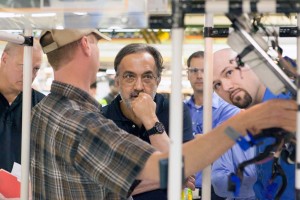A day after the U.S. side of the trans-Atlantic alliance reported in, Italy’s Fiat SpA delivered some unexpectedly good news in the form of a 358 million Euro, or $440 million profit for the second quarter of 2012.
But the numbers wouldn’t have been nearly as good if it weren’t for Chrysler, which saw a 141% increase in its own year-over-year adjusted net earnings. Take away the American automaker’s contribution and Fiat would have sunk 246 million Euros, or $302 million, into the red.
A year ago, Fiat reported earnings of 1.24 billion euro, or $1.52 billion.
The contrast between the two arms of the alliance underscores the dramatic difference between each of the maker’s home market. While the U.S. is still a long way from reaching past peaks, demand has been growing at a double-digit pace this year and Chrysler’s worldwide shipments – largely to North America — rose 22% during the quarter to 630,000 vehicles during the April-June quarter. Fiat has been struggling under the worsening European economy which is rapidly dragging down the Continental car market.
The overall European market dipped from 14.7 million as recently as 2008 to just 13.1 million last year and will struggle to deliver 12 million vehicles in 2012. Fiat’s share of this flatlining market slipped from 8.7% in 2009 to just 6.6% for the first half of 2012.
Complicating matters, the maker’s seven European plants are running at a highly inefficient 60% of capacity. CEO Sergio Marchionne won some much-needed concessions from workers in Italy – where six of those plants are based — over the past year. And he was able to close an aging plant in Sicily but is looking to trim capacity even more if he can overcome the political hurdles in a region where plant closings and layoffs are general considered anathema.
By comparison, Chrysler is running at more than 90% of capacity and has reopened several facilities, including the big Sterling Heights assembly plant slated for closure as part of its 2009 bankruptcy bailout.
Despite the strong contribution from the U.S. partner, not everyone was pleased. Traders drove down Fiat shares following the maker’s earnings announcement, in part because of concerns that while Chrysler earnings are up, year-over-year, its profit margin remained flat at 4.5%. Analysts had expected the margin to increase as Chrysler’s sales rose and factory utilization improved.
But Marchionne continued to exude confidence indicating, on Monday, his belief that Chrysler would “overshoot” its financial targets for 2012 of a $3 billion operating profit and net earnings of $1.5 billion. Today, he indicated that despite the European downturn the two companies collectively expect revenue for the year to top 77 billion Euro, or $94.6 billion, with profits climbing to 5.5 billion Euro, or $6.75 billion.


Hindsight may eventually provide a different view, but currently Marchionne seems like a pretty damned good CEO.